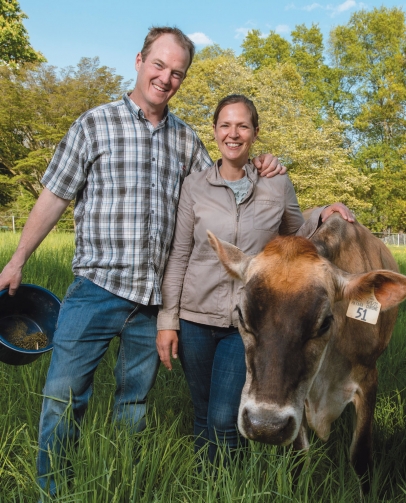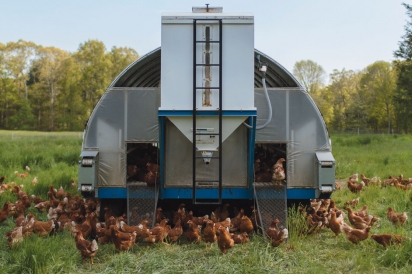Meeting the Challenges of Farming on Rhode Island Soil
Patrick and Kelly McNiff of Pat’s Pastured Share Their Farm Journey
Pat and Kelly McNiff, the husband-and-wife team of Pat’s Pastured, a popular local source of ethically raised, pastured meat and eggs, seem as serene and chill as ducks on a pond. But just as ducks paddle furiously below the waterline, so, too, do the McNiffs: This year, they manage the workloads of 19 employees and will raise 16,000 broilers and 1,200 laying chickens, 650 turkeys, 75 to 100 pigs, 120 ducks and 50 to 75 head of cattle. Oh, and consider their other ventures: a farm store, four summer and two winter farmers markets, food deliveries, summer camp, educational programs, special events and so much more.
After a chance meeting in 2014 at Hope Street Farmers Market in Providence, they met again on Match.com. “Patrick found me on my first day; he rescued me from online dating,” laughs Kelly, the farm store manager and director of education and events. Married since 2016, they have a daughter, Marin, 5, and a son, Cavan, 3.
“People think of ranching and farming as a lifestyle, not a business,” says Patrick, chief executive officer. Yet, like other farms and orchards, Pat’s Pastured must “be a business to survive. To be sustainable, we have to make money.”
“People have a romantic vision of farming and only see the most beautiful parts–– being out in nature,” says Kelly. “That’s the best part of farming, but it’s a small fraction of the whole picture.”
After 12 years of combined experience at Southside Community Land Trust (SCLT) and Casey Farm and earning a master’s degree in community economic development from Southern New Hampshire University, Patrick launched Pat’s Pastured at Casey Farm in 2002. “I could eat really good veggies that I grew, but I couldn’t eat really good meat that I’d grown,” he says. “I read a number of books that inspired me.” Earlier, he’d raised chickens at SCLT’s Urban Edge Farm.
Now, they lease 87 acres from the Town of East Greenwich and another 73 acres in locations around the state, which leads to inefficiencies and uncertainty. While the couple appreciate and welcome being able to serve as farm stewards for the East Greenwich property, Briggs Boesch Farm, that tenancy relationship doesn’t lead to equity in the farmland or a secure, predictable home for Pat’s Pastured or their young family.
According to USDA data, Rhode Island’s farmland is valued at $17,500 per acre, the highest in the nation and far higher than the nation’s $3,800 average value. That’s why the acreage the couple would like to buy—over 100 acres––is simply out of reach. “Rhode Island needs to put money into farmland protection,” he says. “Banks are often reluctant to lend money to farmers and the federal lending program’s six- to eight-month application process is untenable.”
Unlike a vegetable farm, which can be profitable on an acre or two, Pat’s Pastured is a land-intensive, regenerative farm––a farm that uses livestock to regenerate the soil. “We have to move animals and rotational grazing requires more space; we need pastureland and woods,” he says. “The old adage is true: If you don’t inherit it or marry into it, it’s hard to find [affordable] farmland.”
With these challenges, the McNiffs researched their options, including a lease-to-own opportunity on a 200-acre farm in nearby Connecticut, close enough that Pat’s Pastured could keep its beloved Rhode Island customer base. Over two-and-a-half years, the couple worked thoughtfully and deliberately with Land for Good, a nonprofit organization that helps farmers with transition and succession planning, and other consultants. During the lengthy negotiations, they moved some operations to the Connecticut property, regularly transported animals for expanded grazing and built some permanent chicken sheds.
Pat says, “We saw an opportunity to create more production there, which would have been easier for the farm crew and better for animals with fresh pastures.” Of the deal that eventually fell apart, Pat says, “Even when you think someone—in this case a farmer—is ready … successions and transitions are really difficult. We got crushed by it, and lost a lot of money and time.”
Now, without owning farmland, Patrick says, “We’re in a constant state of knowing we might have to pick up and move tomorrow. Last year [when the deal was still in the works and] we were moving cattle and equipment to Connecticut, my mantra was: ‘I’ll never have to do this again.’”
Their wish? “We want a farm with great soil, where we raise healthy animals, sell to great customers, and raise our family,” says Kelly, who is passionate about providing educational programs to visitors of all ages. Even with their challenges, they donate food regularly to a local food pantry and provide food stipends at their farm store for fulltime employees.
“In a decade, a lot of the current farmland won’t exist as farms, but will be solar farms or developed,” says Patrick. “If we don’t do something drastic to preserve it, we’re at the cusp of it disappearing.” Some solutions? “Help provide financing to farmers; don’t prioritize solar development; put more bond money into agriculture. We need to acknowledge that we can’t grow more land and determine how we create more resilient and more affordable farms.”
Crediting Ken Ayars, chief of the Rhode Island Division of Agriculture and Forest Management, and agency staff with doing a great deal with limited resources, Pat adds, “Ken is an amazing resource; he can never leave. He works so hard to preserve farmland.”
State programs include a bond-funded farmland protection program that purchases development rights to ensure farmland remains working farmland. This program is run in conjunction with the Agricultural Land Preservation Commission. Another reduces the tax assessment on farmland enrolled in the State’s Farm, Forest and Open Space Program. “Our preservation efforts slow the loss of farmland, but it doesn’t keep pace with that loss,” says Ayars. “The biggest challenge to the future of agriculture here is access to [affordable] land.” Rhode Island works hard to keep farming economically viable, Ayars adds, and economic viability is key to overcoming farmers’ challenges.
“Belief is my number one strength; I always believe that things will work out,” says Kelly. “One way or another, I hope we will be able to stay in Rhode Island because we love Rhode Island.”
The couple hope to share “lessons learned” from their experiences with fellow farmers. “We hope the next generation can learn from our experiences, particularly the most recent,” Patrick says.
Of these farmers, Ayars says, “Pat and others are so incredibly innovative and passionate about agriculture; the spirit of farmers in Rhode Island––many of whom didn’t grow up with farmland being passed down to them––gives me hope.”
With so much of our food consumed here coming from outside the state, Ayars encourages Rhode Islanders to support Rhode Island farmers and growers by buying what they’re producing and being sensitive to the challenges of farming in relatively urban environments. “Producing local foods means different sounds, sights and smells,” says Ayars.
And turning to the next generation: How would they respond if their young children grew up and wanted to be farmers? Speaking as one, Patrick and Kelly say, “We’d be happy; it’s a great life.”
Nancy Kirsch is a freelance writer in Riverside, Rhode Island. Visit her at NancyKirsch.com.
Pat’s Pastured
830 South Road, East Greenwich
401.830.4PAT (4728); PatsPastured.com
Farm store open 7 days.
Delivery orders and list of farmers markets online.
For more information on how you can help save Rhode Island’s dwindling farmland, visit RIFoodCouncil.org.





